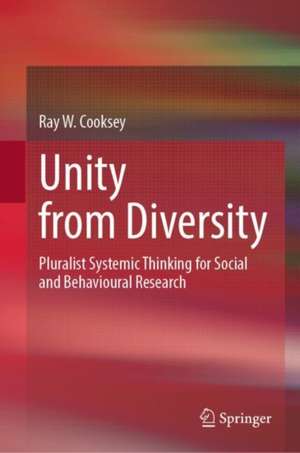Unity from Diversity: Pluralist Systemic Thinking for Social and Behavioural Research
Autor Ray W. Cookseyen Limba Engleză Hardback – 16 iul 2024
Preț: 1017.44 lei
Preț vechi: 1240.77 lei
-18% Nou
Puncte Express: 1526
Preț estimativ în valută:
194.75€ • 211.61$ • 163.69£
194.75€ • 211.61$ • 163.69£
Carte disponibilă
Livrare economică 01-15 aprilie
Preluare comenzi: 021 569.72.76
Specificații
ISBN-13: 9789819734610
ISBN-10: 9819734614
Pagini: 300
Ilustrații: XVII, 474 p. 53 illus., 51 illus. in color.
Dimensiuni: 155 x 235 x 31 mm
Greutate: 0.95 kg
Ediția:2024
Editura: Springer Nature Singapore
Colecția Springer
Locul publicării:Singapore, Singapore
ISBN-10: 9819734614
Pagini: 300
Ilustrații: XVII, 474 p. 53 illus., 51 illus. in color.
Dimensiuni: 155 x 235 x 31 mm
Greutate: 0.95 kg
Ediția:2024
Editura: Springer Nature Singapore
Colecția Springer
Locul publicării:Singapore, Singapore
Cuprins
Pluralist Systemic Thinking for Researchers.- The Evolving Landscape of Choices for Navigating the ‘Data Triangle’.- Systemic Contextualisation: Situating & Positioning.- Systemic Contextualisation: Guiding Assumptions & Framing.- Making Convincing Choices: Scoping, Configuring & Implementing.- Making Convincing Choices: Sharing/Communicating Research Outcomes.
Notă biografică
Ray is Emeritus Professor of Management at the University of New England (UNE). He obtained his Ph.D. in environmental/social psychology from Colorado State University. After a year working in ergonomics with the Bendix Corporation in the USA, he taught and researched in education, psychology, and business departments at UNE over the course of his 32-year academic career. He has trained/supervised many postgraduate students in a wide variety of areas/disciplines and is well-known for his expertise in research methods as well as decision making and organisational behaviour. He helped develop the PhD.Innovation (PhD.I) professional doctorate programme at UNE. His interests in systems thinking, complexity theory, and methodological diversity played strong roles in helping to shape his pluralist systemic thinking perspective for social and behavioural researchers. He has produced numerous book chapters, refereed journal articles, refereed conference papers, and technical and government reports.
Textul de pe ultima copertă
This book is about the choices that researchers can make when building knowledge in social and behavioural spaces. Knowledge is the unity we seek and, given that social and behavioural research is a human endeavour focusing on human lives and experiences, there are diverse and ever-evolving pathways towards achieving that unity. Any one pathway will only ever yield partial glimpses into human life and diversity of potential choices serves to enrich, expand, and enlarge those glimpses in pursuit of more complete understanding. The book shows that researchers and the researched are far more connected than disconnected in this world and those connections are spread out through a network of interlinked complex systems. The book argues that pluralist systemic thinking provides the means by which a researcher’s methodological choices for navigating the ‘Data Triangle’ (comprising data source, data gathering, and data analysis strategies) and the learning they provide can be fully and robustly contextualised with respect to those systems and the expectations and influences that emerge from them. Such contextualisations facilitate the refinement, augmentation, and/or narrowing of those choices during the researcher’s journey. Anticipating choices downstream may have implications for more immediate choices and more immediate choices may create a cascade of necessary downstream choices. An essential part of contextualisation involves making choices about patterns of guiding assumptions, modes of knowledge building, and research frames. Researchers must develop the capacity to be flexible and adapt to unanticipated emergent events, obstacles, and political influences, making trade-offs where necessary throughout their research journey, always with an eye on both feasibility and quality. Importantly, research has no meaning unless the researcher can ensure that it connects with intended audiences via specific research outcomes, especially since the ultimate judgments about the convincingness, meaningfulness, quality, and utility of the research are vested in those audiences. Throughout the book, special attention is devoted to the role(s) that stakeholders and gatekeepers play in shaping the researcher’s journey as well as to what can be learned from Indigenous/First Nations perspectives on social and behavioural research.
Caracteristici
Explores pluralist systemic thinking as a process for conceptualising and carrying out social and behavioural research Implements a ‘unity from diversity’ logic when considering methodological choices Focuses on making research choices that yield more convincing outcomes for relevant audiences
